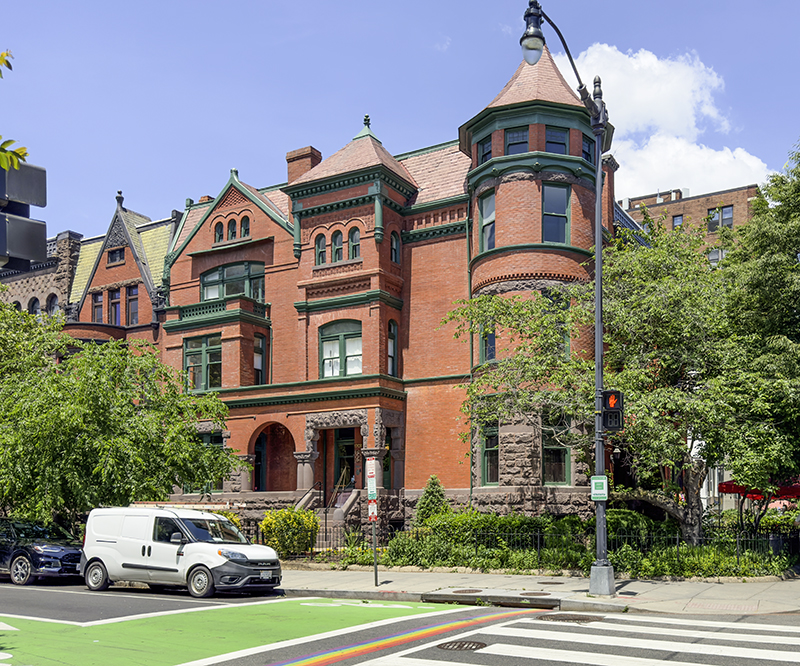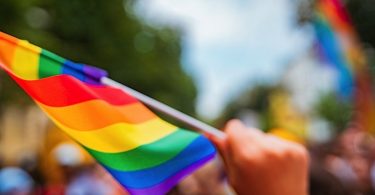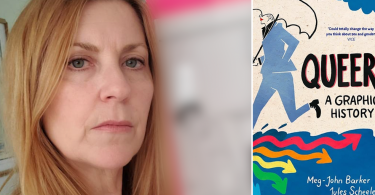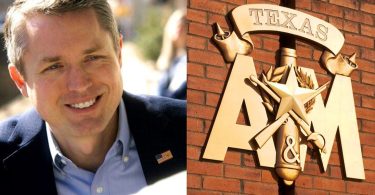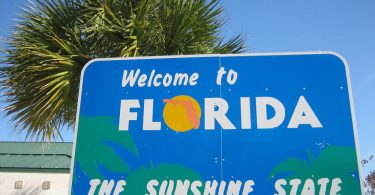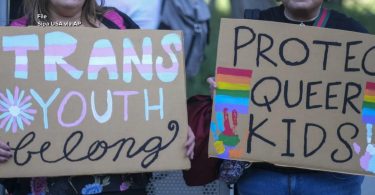Destination Tomorrow DC Location – Photo: Todd Franson
“At Destination Tomorrow, our mission is to make sure that LGBTQ communities have access to resources and services and a familiar setting,” says Sean Ebony Coleman, founder and CEO of the LGBTQ service provider Destination Tomorrow, which recently set up shop in D.C.’s Dupont Circle neighborhood.
The organization, which caters to communities of color and transgender and nonbinary communities aged 13 and up, already has offices in the Bronx and Atlanta and, on May 17, cut the ribbon on its D.C. headquarters at 1701 Q St. NW, which abuts Floriana restaurant.
“We provide direct services that are rooted in economic empowerment,” says Coleman. “We provide financial literacy classes, job readiness, professional development, GED, food pantries, assistance with housing and housing itself, teen-specific programs, counseling and case management, and HIV testing. Those are the things we’re proposing to bring to the district, following the same formula and recipe that we use in New York and Atlanta.
“We’re going to come in and provide a one-stop shop to receive all of those services,” he continues, “in addition to doing workshops and trainings for city government, corporations, and other organizations that want to engage with the LGBTQ community but may not have the language or the cultural competency to engage at that level.”
The Richardsonian Romanesque-style building housing Destination Tomorrow has four separate floors, including an English basement with a separate entrance that is expected to house the organization’s HIV testing and health services. Coleman says plans to set up a behavioral health clinic and a telemedicine program, similar to the one in place in New York as part of a partnership with Montefiore Medical Center, are also being considered, although nothing has been green-lit at the moment.
The building’s first floor features a waiting area and some office space. The second floor is earmarked for a computer lab and learning services, and the third floor can be utilized for community meetings or serve as office space for smaller organizations unable to purchase their own headquarters.
“There’s enough space for us to serve as an incubator for other organizations that just want to get started,” Coleman says. “One of the issues we saw in New York and Atlanta is that there are folks doing work, but don’t have a brick-and-mortar building. So those organizations will have access to our space, a desk, and all of the things to help them get up and running.”
The newly opened center, which began accepting clients on Monday, May 20, is open weekdays from 11 a.m. to 7 p.m., although that may shift based on community needs. The center plans to develop its various offerings and services over the next month following a series of community listening sessions and meetings with local organizations.
“Normally what we do is outreach engagement,” Coleman says. “We are collaborative, so we come in and identify players in the market, who’s doing what, and how we can assist if there’s some alignment with the missions and visions of organizations that are already on the ground. For now, we’re going to stick to the services we’re familiar with, unless we can identify services that no other organization has addressed yet.
“Our goal is not to replicate resources,” he adds, “but rather join and expand the existing network of support for LGBTQ individuals, specifically Black and transgender folk, who have an even greater need for advocacy and support amid an election year.”
Case in point, the DC LGBTQ+ Community Center broke ground on a new location in the Shaw neighborhood last year. Despite some overlap and plans to expand programming options, Coleman insists there’s no conflict between the two entities — rather, they can help complement each other while ensuring that they can take on additional caseloads when it comes to those seeking services.
“We’re not coming in to step on anyone’s toes,” Coleman stresses.
Last year, Destination Tomorrow served more than 22,000 people between its two locations, and is hoping to increase that by at least one-third in D.C., according to Sage Rivera, Destination Tomorrow’s chief strategy officer.
While there’s currently no 24-hour crisis line in place to serve potential clients, the organization hopes that actively soliciting feedback from the community may lead to nontraditional offerings or holding special events outside of regular business hours.
Rivera, whose family hails from the area, is open to exploring the idea of a mobile unit that could serve far-flung communities within the D.C. area, noting that there are some significant LGBTQ clusters outside the confines of the city, such as in Silver Spring or Alexandria.
“We’d like to bring out the information and resources to all those neighboring areas,” Rivera said.
Coleman’s vision for the new community center is to ensure that others can see themselves represented by or valued within the organization.
“When we talk about leadership, when we talk about movement building with regards to the LGBTQ community, oftentimes, there’s not an adequate representation of black and brown folks,” he says.
“I’m a Black trans man, who has not always seen himself represented in certain spaces, who has experienced homelessness, underemployment, and discrimination based on my gender as well as my race. That’s initially why I started Destination Tomorrow and why I continue to do the work.
“I want to provide those services and that support I needed — but didn’t exist — when I was coming up,” he adds. “I want to make it easier for those folks that are coming up behind me to access the resources and services that they need.
“At the end of the day, this is an LGBTQ center, and we want to make sure that no one who needs these types of services have to go without, or travel to other cities and states just to receive them.”
Destination Tomorrow is located at 1701 Q St. NW in Washington, D.C. To learn more, email [email protected] or visit www.destinationtomorrow.org.

